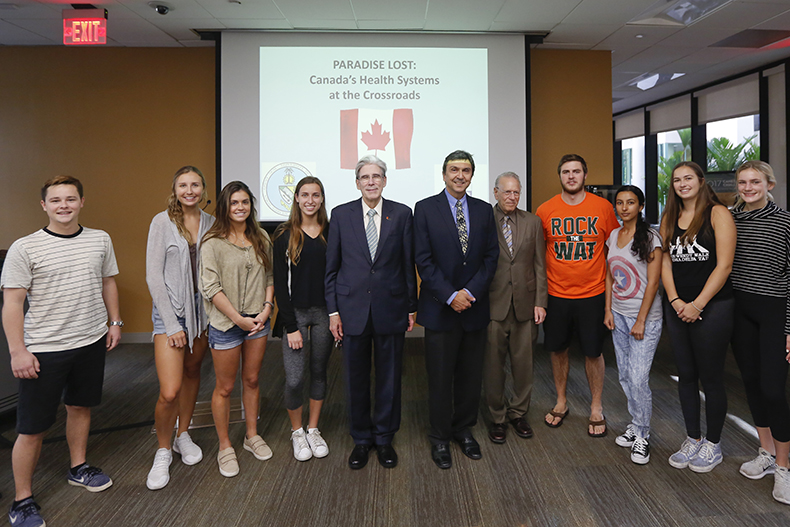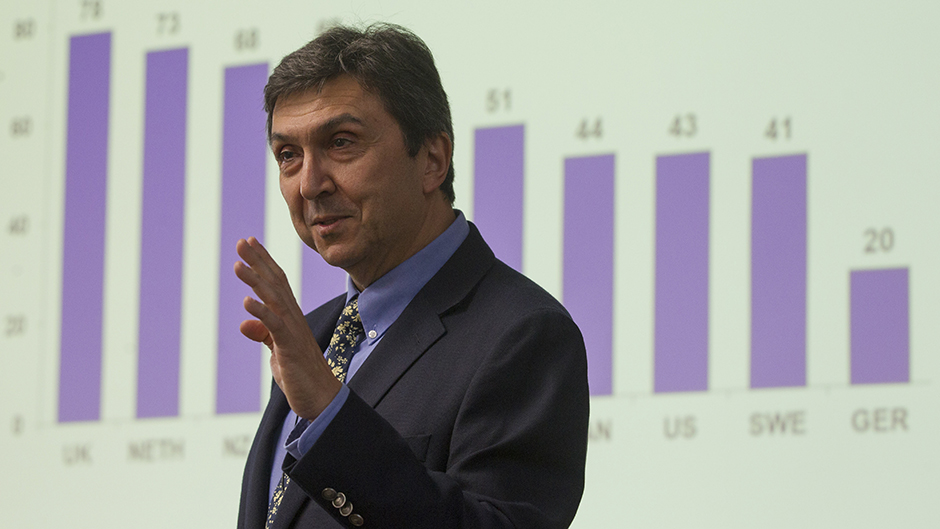Public health policy pioneer C. David Naylor, a University of Miami Distinguished Presidential Scholar, cautioned against the tendency in the United States “to become fixated on favorable comparisons” with health care systems in his native Canada, often touted as “the great innovative nation.”
In his talk, Paradise Lost: Canada’s Health Care Systems at the Crossroads, hosted November 14 at the School of Business Administration, Naylor said Canada for decades has put forth a series of good ideas, “but we don’t scale them or implement them—we’re a country of perpetual pilot projects.”
“Our health care systems muddle through and continue to work even when they shouldn’t—there’s an urgent need for renewed commitment to collaboration and shared political resolve.”
UM President Julio Frenk welcomed Naylor as “a respected scholar and dear friend” to the first of his four talks at the University over three days. Renowned for his contributions to health research, education, administration, and policy, Naylor becomes the fifth Distinguished Presidential Scholar hosted by UM to date, a subset of an initiative geared to attract new talent and to explore our geographic advantage, according to the president.

Naylor has chaired numerous high-profile health care commissions over four decades of involvement, most recently a four-year endeavor that assessed health care reform in Canada that concluded in 2015. In early 2000, he chaired the Canadian commission that investigated the Severe Acute Respiratory Syndrome (SARS) epidemic, which launched in China then moved elsewhere. President Frenk credited Naylor’s team with “reshaping the landscape of public health” and said the report has been used as a blueprint globally.
In Paradise Lost, Naylor stressed the importance of taking a long-term historic look at how the Canadian health care systems have evolved over time in order to make more accurate comparisons between that system and the one in the United States. In the 1910s, both countries were clamoring for health care for all sectors of society.
“People forgot how loud the voices were for universal health care,” Naylor said. Yet the world wars and Depression diminished those voices, and it wasn’t until 1947 that the western Canadian province of Saskatchewan pioneered the first foray in Canada. A decade later, the federal government in Canada backed the idea.
Naylor lamented the “budget silos and big tap that controls costs” that have plagued Canada and created obstacles to true change in recent decades.
“Progress has been so slow, it’s allowed us to do enough incremental change to avoid making the real changes that we should make,” said the 2016 inductee to the Canadian Medical Hall of Fame.
Naylor is the founding director of the renowned Institute for Clinical Evaluative Sciences (ICES), which this year celebrates its 25th year in operation. A hub for health care collaborative research, the ICES has enjoyed significant success in providing the secure and accessible array of Ontario’s health-related data.
Naylor parsed his presentation with statistical data to show comparisons in terms of health care systems across the world over time. Ultimately, he suggested the United Kingdom as the premier model.
“There are lots of frustrated doctors and nurses in the U.K.,” he said, “but the way they’ve transformed their system over time is unbelievable—they are a model for the world in terms of courageous decision-making.”
That transformation, however, required “massive spending” and such a transition is not affordable for the United States. He suggested instead that the U.S., currently attempting to generate some alternative for the Affordable Care Act, look to the Netherlands, Switzerland, and other Western European nations as possible models.
In addition to Paradise Lost, Naylor’s other talks include Endemic Mismeasurement: Heretical Musings on Health, Illness, and Evidence; Universal Health Care: Canada and the U.S. Revisited; and What Happens When Science Is Shortchanged.
Naylor served as the past dean of medicine and is president emeritus at the University of Toronto, among the largest universities in the world with 88,000 students. He was asked about the major challenge of running such a large institution.
“I’m not sure anyone really runs a large multi-campus university,” he replied. “The different parts all run themselves and the president runs after them! That said, scale and diversity do create incredible educational and research opportunities for students and faculty alike, along with some challenges. In Toronto those challenges fell into three buckets. First, trying to make sure students, particularly first-year undergraduates, could find their way, be valued as individuals, and not be overwhelmed by the size and complexity of the place. Second, ensuring that we had academic structures—programs, centers, and schools –—that embraced and capitalized on our breadth and depth, and fostered cross-disciplinary research and learning. And third, keeping the central administration connected and, within reason, responsive not just to a huge number of divisions and departments across three campuses, but to individual faculty, staff and students.
As part of his ongoing collaboration with the University, Naylor will be advising a student group at the School of Business Administration that is generating a study on the health care systems in Canada.

